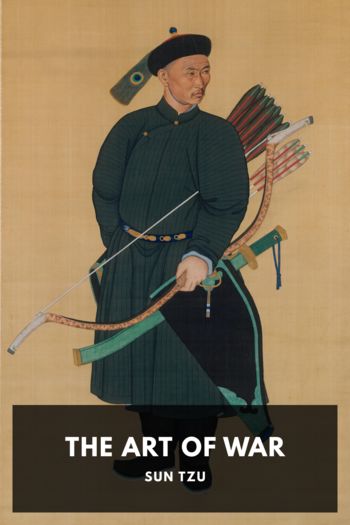The Art of War, Sun Tzu [best english books to read for beginners TXT] 📗

- Author: Sun Tzu
Book online «The Art of War, Sun Tzu [best english books to read for beginners TXT] 📗». Author Sun Tzu
Hence it is not enough to put one’s trust in the tethering of horses,622 and the burying of chariot wheels in the ground.623
The principle on which to manage an army is to set up one standard of courage which all must reach.624
How to make the best of both strong and weak—that is a question involving the proper use of ground.625
Thus the skilful general conducts his army just as though he were leading a single man, willy-nilly, by the hand.626
It is the business of a general to be quiet and thus ensure secrecy; upright and just, and thus maintain order.627
He must be able to mystify his officers and men by false reports and appearances,628 and thus keep them in total ignorance.629
By altering his arrangements and changing his plans,630 he keeps the enemy without definite knowledge.631 By shifting his camp and taking circuitous routes, he prevents the enemy from anticipating his purpose.632
At the critical moment, the leader of an army acts like one who has climbed up a height and then kicks away the ladder behind him.633 He carries his men deep into hostile territory before he shows his hand.634
He burns his boats and breaks his cooking-pots;635 like a shepherd driving a flock of sheep, he drives his men this way and that, and none knows whither he is going.636
To muster his host and bring it into danger:—this may be termed the business of the general.637
The different measures suited to the nine varieties of ground;638 the expediency of aggressive or defensive tactics;639 and the fundamental laws of human nature: these are things that must most certainly be studied.
When invading hostile territory, the general principle is, that penetrating deeply brings cohesion; penetrating but a short way means dispersion.640
When you leave your own country behind, and take your army across neighborhood territory,641 you find yourself on critical ground.642 When there are means of communication643 on all four sides, the ground is one of intersecting highways.644
When you penetrate deeply into a country, it is serious ground. When you penetrate but a little way, it is facile ground.
When you have the enemy’s strongholds on your rear,645 and narrow passes in front, it is hemmed-in ground. When there is no place of refuge at all, it is desperate ground.
Therefore, on dispersive ground, I would inspire my men with unity of purpose.646 On facile ground, I would see that there is close connection between all parts of my army.647
On contentious ground, I would hurry up my rear.648
On open ground, I would keep a vigilant eye on my defences.649 On ground of intersecting highways, I would consolidate my alliances.650
On serious ground, I would try to ensure a continuous stream of supplies.651 On difficult ground, I would keep pushing on along the road.652
On hemmed-in ground, I would block any way of retreat.653 On desperate ground, I would proclaim to my soldiers the hopelessness of saving their lives.654
For it is the soldier’s disposition to offer an obstinate resistance when surrounded, to fight hard when he cannot help himself, and to obey promptly when he has fallen into danger.655
We cannot enter into alliance with neighboring princes until we are acquainted with their designs. We are not fit to lead an army on the march unless we are familiar with the face of the country—its mountains and forests, its pitfalls and precipices, its marshes and swamps. We shall be unable to turn natural advantages to account unless we make use of local guides.656
To be ignorant of any one of the following four or five principles657 does not befit a warlike prince.658
When a warlike prince attacks a powerful state, his generalship shows itself in preventing the concentration of the enemy’s forces. He overawes his opponents,659 and their allies are prevented from joining against him.660
Hence he does not strive661 to ally himself with all and sundry,662 nor does he foster the power of other states. He carries out his own secret designs,663 keeping his antagonists in awe.664 Thus he is able to capture their cities and overthrow their kingdoms.665
Bestow rewards without regard to rule,666 issue orders667 without regard to previous arrangements;668 and you will be able to handle a whole army669 as though you had to do with but a single man.670
Confront your soldiers with the deed itself; never let them know your design.671 When the outlook is bright, bring it before their eyes; but tell them nothing when the situation is gloomy.
Place your army in deadly peril, and it will survive; plunge it into desperate straits, and it will come off in safety.672
For it is precisely when a force has fallen into harm’s way that is capable of striking a blow for victory.673
Success in warfare is gained by carefully accommodating ourselves to the enemy’s purpose.674
By persistently hanging on the enemy’s flank,675 we





Comments (0)